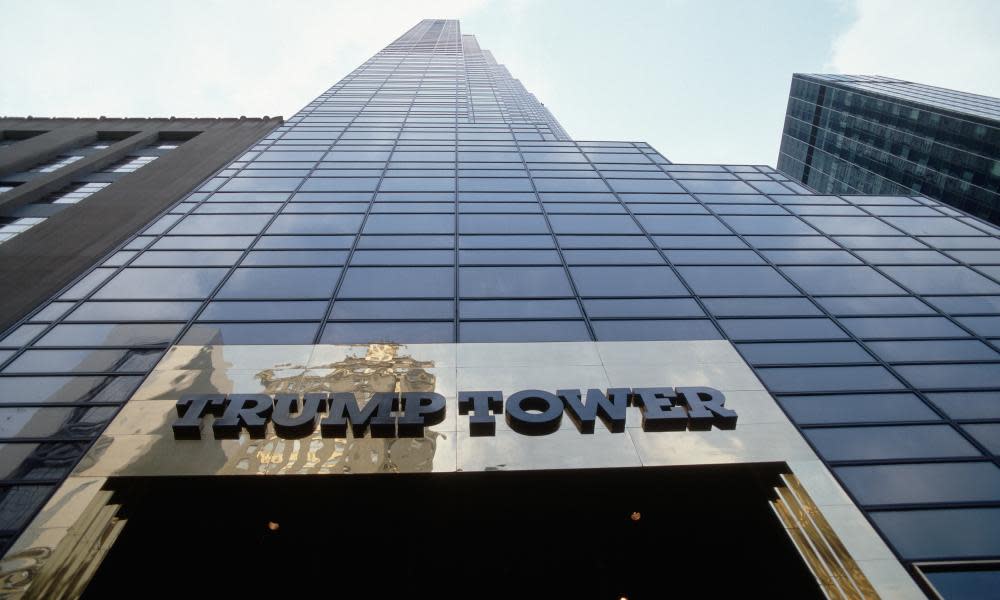Russian man at Trump Jr meeting had links to businessman with alleged Soviet intelligence ties, US investigators said

A Russian participant in the notorious meeting held by Donald Trump’s son at Trump Tower last year had business ties to a man who was believed by US authorities in a 2000 US government report to have links to former Soviet intelligence officials.
Irakly Kaveladze was identified this week as the eighth attendee of the June 2016 meeting, which has become central to questions over Russian interference in last year’s presidential election.
Trump’s son, Donald Jr, agreed to the meeting after being told by email that he would be given damaging information about Hillary Clinton, their Democratic opponent, as part of an effort by the Russian government to support Trump. Trump Jr has been called to testify about the meeting to senators in Washington next week.
Kaveladze, a 52-year-old executive at a Moscow-based property firm with ties to Trump, was found in a 2000 US Government Accountability Office report to have created hundreds of shell companies for a $1.4bn scheme that US investigators suspected was used to launder Russian money through American banks.
According to the GAO report, the firm used by Kaveladze in that operation contracted with a company owned by “a Russian director” whose identity has been separately confirmed by US officials to be Boris Goldstein, whose alleged ties to former KGB officers attracted interest from US investigators after he moved to California in the early 1990s.
“We have obtained information that indicates that this individual has had a close relationship with companies associated with members of the former Soviet Union’s intelligence agency,” the US GAO said in a little-noticed footnote to a report in 2000.
Boris Goldstein, a Latvian born banker, was not identified by name in the 2000 report, but his biography matched that of the person described by investigators, and he was identified as a focus of the GAO’s probe at the time by the San Francisco Chronicle.
In a telephone interview this week, Goldstein, 53, denied having ties to intelligence agencies in Russia or the former Soviet Union. He said he now worked in venture capital funding technology companies. “I’m so far away from all political stuff, intelligence stuff,” he said. Goldstein also said that he does not recall any interactions with Kaveladze and that he has not had any contact with Kaveladze during the past 20 years.
Kaveladze visited Trump Tower on 9 June 2016 with Natalia Veselnitskaya, a Russian attorney with ties to the Kremlin, who on Friday was revealed to have represented Russia’s FSB security agency in recent years. They were joined by Rinat Akhmetshin, a Russian American political operative and former military officer. Akhmetshin is widely reported to be a former Soviet counter-intelligence officer.
The Russians met Trump’s son Donald Jr, son-in-law Jared Kushner, and campaign chairman Paul Manafort.
Kaveladze’s attorney, Scott Balber, did not respond to questions about the $1.4bn money transfer system involving Russian funds. He has previously said the setup was a legitimate business and that Kaveladze was not judged to have done anything wrong.
Before moving to the US in 1991, Goldstein had co-founded a bank in his native Latvia that merged with a bank run by Edmunds Johansons, the former chairman of the KGB in Latvia. Goldstein says that Johansons did not work with the bank he founded or during any time that Goldstein had an interest in the merged bank and that he had never met nor spoken with Johansons.
Among the merged bank’s biggest investors was Mabetex, a Swiss-based construction company that was later accused of bribing senior Russian officials including president Boris Yeltsin to win $1.5bn in contracts to refurbish the Kremlin. Charges relating to the scandal were brought in Russia and Switzerland but no one was ever convicted.
US intelligence sources cited in a 1999 investigation by the Pulitzer-winning investigative reporter Knut Royce said that a firm in which Goldstein was an investor employed “as many as five former Latvian KGB officers”. Goldstein says that he was never involved with the KGB or the Communist Party. He says that if any employees were former KGB officers, he was never aware of that at the time.
After moving to the US in 1991, Goldstein bought a $1m stake in the Commercial Bank of San Francisco in 1994. In 1996, according to the GAO investigators, Goldstein’s company signed a contract with a company owned by Kaveladze for Kaveladze to introduce potential banking customers to Goldstein’s company, and then open bank accounts for them at Commercial Bank, where Goldstein was director of private banking and international banking.
More than $600m was wired into about 100 accounts opened at Commercial Bank for these Russian clients, while another $280m was wired into four Citibank accounts, according to the US investigators. Most of this money was then transferred out to foreign locations including in eastern Europe. Another $800m was deposited from overseas into accounts that Kaveladze opened for Russian clients with Citibank. About 70% of this, too, was transferred overseas.
“These transfers raise concerns that the US banking system may have been used to launder money,” the GAO investigators said in their conclusions. The GAO passed their findings to law enforcement agencies but no charges were ever brought.
Neither the FDIC nor the Office of Currency Control in the United States ever filed any enforcement actions against Goldstein or his companies.
• 16 October 2018 : This Article has been updated to include further comments and responses from Boris Goldstein.

 Yahoo News
Yahoo News 
